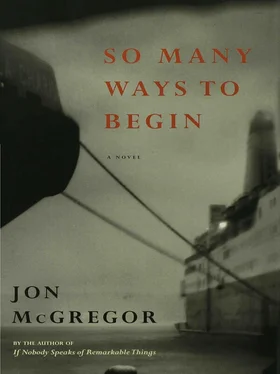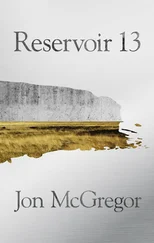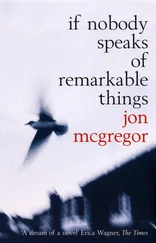People laughed when Eleanor told these stories. Not at the stories themselves, but at the delight she took in turning these things into bleak caricatures, at the unexpected contrast with her usually quiet and self-contained self. Sometimes, David thought, people laughed more from an awkward embarrassment — especially when she joked about being sent to bed without supper for cursing, or being smacked in the teeth for losing a schoolbook — than because they were amused. She'd usually had too much to drink when she said these things, and by the time everyone had gone home she would tip over into regret. Did I say too much David? she would ask, as he helped her up the stairs. Did I embarrass myself any? Did I say too much?
Was that true? he asked her, once. What you said last night? He was standing halfway up a stepladder as he said this, a paintbrush balanced wetly on the lip of a tin. They were decorating their back room, finally, the furniture stacked under a sheet in the middle of the room, wallpaper shreds scattered across the floor. Eleanor was rubbing down the wall on the other side of the room, her hair tied back from her face with an elastic band and the sleeves of an old work-shirt rolled up to the elbow.
Hmm? she said, above the rough shush of the sandpaper. Was what true?
You know, he said, about being smacked, in the teeth you said. The words felt odd even as he said them.
Oh, that, she said, aye, of course. She seemed distracted, surprised that he'd even had to ask.
I mean, literally in the mouth? he said. She laughed a little, picking at a stray scrap of wallpaper still stuck to the bare grey plaster.
Yes David, she said. Right in the mouth. Why?
Well, he said. It just seems a bit much, that's all. She didn't say anything, and he lifted the brush to press another wet slick of pale yellow paint against the wall. They both worked in silence for a few minutes, Eleanor taking a damp cloth to wipe the dust from the wall, David dipping the brush in and out of the pot.
It didn't just happen once then? he said. She looked at him blankly.
What? she asked.
Being hit like that, he said, and again she seemed surprised that he was asking.
Well no, she said, I suppose not. It didn't happen all the time, and I suppose getting hit in the mouth was unusual. But I can't really remember. Why?
David climbed down, moved the ladder further along the wall, and climbed up again. Because it bothers me Eleanor, he said. It's not normal, it's not right. Why didn't you ever tell someone about it? She laughed tightly, as if she thought he was being naive, and she took the cloth into the kitchen to rinse it out.
Oh, come on, she said. Tell who? She came back into the room and began wiping along the top of the skirting board. Anyway, she said, changing the subject, what did you think about John last night?
John? he said. Oh, right. He seemed okay I thought. I mean, Susan seems very happy with him, doesn't she?
Aye but he doesn't say much, does he? she said. He barely said a word all evening.
David laughed.
That's because he couldn't get a word in edgeways, he said, the way you were going all night. He laughed again, and Eleanor was silent. He finished painting what he could reach from the ladder, and climbed down, and it was only when he turned round and saw how flushed her face was that he realised how much he'd upset her.
Oh El, he said. I didn't mean it. He moved towards her and she pulled away very slightly. I was only joking, he said.
I ruined the evening, didn't I? she said, whispering, staring straight ahead.
Of course not, he said. Don't be silly.
I did, she said. I ruined the evening. She put her hands over her face, as if she was ashamed even to be looked at. He sighed and put the pot and the brush down on to a sheet of newspaper.
Eleanor, he said, I was only joking. Everyone had a lovely evening. He took hold of her wrists and gently lifted her hands away from her face.
Really? she said.
Really, he said, licking his thumb and wiping a smear of plaster dust from her forehead; I promise. She wrinkled her nose and looked up at him, and the flush of embarrassment ebbed out of her face. She smiled.
I'm sorry, she said. It just worries me, what people think, especially your family and everyone. He kissed her forehead, then her nose.
They all think the world of you, he said. And so do I. He let go of her wrists, kissed her lips, and started to unbutton the worn-out shirt she was wearing, uncovering her small neat breasts. So do I, he murmured again, stooping to kiss each dark nipple, unbuttoning the rest of her shirt, slipping his hands behind her back. Eleanor stepped away, covering herself and fiddling with the buttons.
David, she said, quietly. Not now. I'm not— she said, and stopped. We've hardly started in here, she said. Give me a brush. David passed her another brush, wiping his mouth with the back of his hand, surprised and a little embarrassed at himself. He moved the ladder, and went back to the painting without saying anything more.
Later, sharing a bag of chips while they waited for the first coat to dry, she said, I'm sorry about before. I just wasn't feeling like it; I wras a bit preoccupied.
It's fine, he said, pretending to have forgotten. Don't worry about it.
And the next day, when all the painting was done, the brushes washed and the spattered newspaper thrown away, the furniture shifted back into place and the pictures rehung on the wall, when they were looking around the room and each wondering if they'd ever really like the colour, she turned to him and said well, I think we're all done here now, aren't we? She swept the loose strands of hair away from her face and unbuttoned her shirt. He noticed that she still had yellow paint under her fingernails, and across one of her knuckles, and he noticed that she was shrugging her shirt to the floor.
Afterwards, lying across their bed together, he said now tell me something. She turned her face towards him, questioningly. Tell me what it was like, at home, when you were growing up. I want to know more, he said.
So she told him about watching her mother clean the kitchen floor when she was a child barely old enough to speak; hiding under the table, watching soap bubbles balloon and burst into the cold sunlight as her mother's wooden-soled shoes slid like skates across the wet flagstoned floor. The hot soapy water slopping towards her, and her mother hoisting the chairs from the floor and slamming them up on to the table as she caught glaring sight of her daughter.
She told him about her mother not talking to her for days at a time, not talking to anyone, stopping in bed with a mystery illness that nobody ever discussed.
She told him about having to make her brothers' beds each morning, slipping out of her own to straighten the mess left from the morning's rush into work, gathering the tight-rolled balls of yesterday's socks and heaping them into the wash-bag, untangling the sheets and blankets from their heap at the bottom of the bed.
She told him about her mother cutting her hair, insisting on keeping it short so that it wouldn't be any trouble, never taking any time over it so that she always came out looking hacked and shorn and the other children would tease her. I didn't dare say anything though, or ask to get it done in a shop, she said, Mam would have walloped me. It was only when she was older, fourteen, fifteen, that she resisted and persuaded her mother to let her be, and her hair began to grow long and straight and fine. I couldn't keep my hands off it for a long time, she said, smiling, playing with it even as she spoke; it seemed like such a new part of me.
She told him that once, when it had reached down to her shoulders, her brother's wife Rosalind had brushed it for her, telling her how she could keep it nice, showing her different ways of wearing it, running the brush and her fingers through it over and over again. It was the first time anyone had touched me like that, she said.
Читать дальше
Конец ознакомительного отрывка
Купить книгу











